2021年七年级英语下学期《快乐英语》阅读教学案(无答案) 牛津版
- 格式:doc
- 大小:31.00 KB
- 文档页数:4
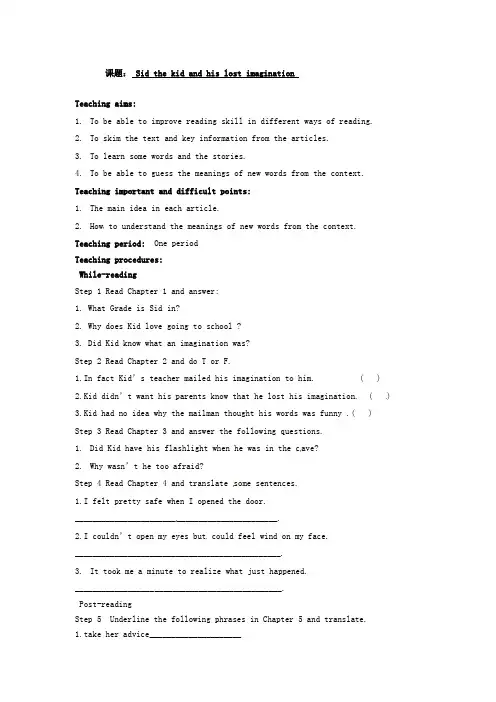
课题: Sid the kid and his lost imaginationTeaching aims:1.To be able to improve reading skill in different ways of reading.2.To skim the text and key information from the articles.3.To learn some words and the stories.4.To be able to guess the meanings of new words from the context. Teaching important and difficult points:1.The main idea in each article.2.How to understand the meanings of new words from the context. Teaching period: One periodTeaching procedures:While-readingStep 1 Read Chapter 1 and answer:1. What Grade is Sid in?2. Why does Kid love going to school ?3. Did Kid know what an imagination was?Step 2 Read Chapter 2 and do T or F.1.In fact Kid’s teacher mailed his imagination to him. ( )2.Kid didn’t want his parents know that he lost his imagination. ( )3.Kid had no idea why the mailman thought his words was funny .( ) Step 3 Read Chapter 3 and answer the following questions.1.Did Kid have his flashlight when he was in the c ave?2.Why wasn’t he too afraid?Step 4 Read Chapter 4 and translate some sentences.1.I felt pretty safe when I opened the door.______________________________________________.2.I couldn’t open my eyes but could feel wind on my face._______________________________________________.3.It took me a minute to realize what just happened._______________________________________________.Post-readingStep 5 Underline the following phrases in Chapter 5 and translate.1.take her advice_____________________2.give up___________________________3.look at me in surprise________________4.lie on the sofa______________________5.at the feet of the Queen_______________6.turn back__________________________Step 6 Read Chapter 6 and answer:1.Did Sid find his imagination at last?2.Who helped Sid find his imagination?Key Excerpt1.Wonderful phrases (精彩短语)1.have no idea2.take a lot of pride inugh at4.figure it out on my own5.decide to do6.feel a little better7.as soon as8.say hello to9.get out of10.sound like11.this whole search for my imaginationst but not least13.move to14.be afraide up with16.allow sb. to do17.be able to18.be supposed toWonderful sentences (精彩句子)1.It is frustrating to look for something when you don’t even know what it looks like.2.I looked around at everyone else but no one seem to care about it.3.I try hard to find my imagination.4.The fi rst thing I did was to look under my bed, but the craziest thing happened.5.I guess my imagination was not there because I looked aroun d as fast as I could.6.For now, I was back in my roo m safe and but still had no imagination.7.I wasn’t exactly sure what an imagination even looked like.8.I can’t believe my imagination was with me this whole time.2.Wonderful paragraphs (精彩段落)1)I was afraid. I have no idea what an imagination was. I have heard the word many times but never really took the time to understand what it meant. I looked around at everyone else but no one seem to care about it. I decided not to ask anyone about it. I didn’t want anyone to laugh at me for not knowing what an imagination is. So, I decided I would figure it out on my own.我害怕了,我不知道什么是想象力。
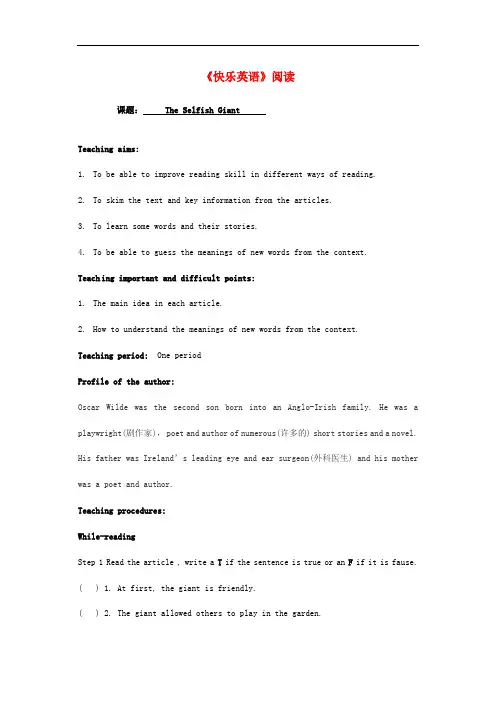
《快乐英语》阅读课题: The Selfish GiantTeaching aims:1.To be able to improve reading skill in different ways of reading.2.To skim the text and key information from the articles.3.To learn some words and their stories.4.To be able to guess the meanings of new words from the context.Teach ing important and difficult points:1.The main idea in each article.2.How to understand the meanings of new words from the context.Teaching period: One periodProfile of the author:Oscar Wilde was the second son born into an Anglo-Irish family. He was a playwright(剧作家), poet and author of numerous(许多的) short stories and a novel. His father was Ireland’s leading eye and ear surgeon(外科医生) and his mother was a poet and author.Teaching procedures:While-readingStep 1 Read the article , write a T if the sentence is true or an F if it is fause. ( ) 1. At first, the giant is friendly.( ) 2. The giant allowed others to play in the garden.( ) 3. Children didn’t like to play on the road.( ) 4. The little boy often played with the giant.( ) 5. The giant missed the little boy very much.Step 2 Read the article , answer the following questions.1. What did the children do when they finished school every afternoon? __________________________________________________________2. Were the children happy in the garden?__________________________________________________________3. Which season was in the garden when the Spring came outside?__________________________________________________________4. Why wouldn’t the Spring come in the giant’s garden?__________________________________________________________5. Why didn’t the little boy run away?__________________________________________________________Post-readingStep 3 Key Excerpt1.Wonderful phrases (精彩短语)a.see the children playing in the gardenb.cry in a very angry voicec.put up a notice boardd.invite the North Wind to stay with theme.run round and round the garden as fast as he could gof.look out at his cold white gardeng.dance about through the treesh.sing with delighti.break at once into blossomj.be very kind to all the children2.Wonderful sentences (精彩句子)a. The Snow covered up the grass with her g reat white jacket, and all the treeswere in white.b. He was dressed in grey, and his breath was like ice.c. But the Spring never came, nor the Summmer.d. One morning, the Giant was lying awake in bed when he heard somelovely music.e. The Giant ran downstairs in great joy, and out into the garden.f. Today you shall come with me to my garden, the Paradise.3. Wonderful paragraphs (精彩段落)(1). It was a large lovely garden, with soft green grass. Here and there were twel ve peach-trees that in the spring-time broke out into delicate blossoms of pink and pearl, and in the autumn bore rich fruit. The birds sat on the trees and sang so sweetly that the children used to stop their games in order to listen to them. "How happy we are!" they cried to each other.(2). Suddenly he rubbed his eyes in wonder and looked and looked. In the farthest corner of the garden was a tree quite covered with lovely white blossoms. Itsbranches were golden, and silver fruit hung down from them, and underneath it stood the little boy he had loved.4. Summary of the content (内容梗概)The story mainly tells us a story of a very selfish giant. He kept the children out of his personal garden because of his selfis hness. By doing this, he also stopped spring, joy and happiness from coming. After a long period of waiting for spring, joy and happiness, he realized his selfishness and started to behave more generously. Spring, joy and happiness all came back along with the happy children. In the end, the giant died happily and peacefully. He was brought to the heaven by the little boy he had once helped.Step4 Questions and insights1.Questions after readingWhy do the Spring go with the children in the article?2.Insights after readingThe hearts of the children are very pure. They treat everybody the same way. They act out directly what they think in mind. They never hide. They forgive other’s faults instead of remembering them. I think if we all face our lives with less vision for the future, if we foc us more on what we own at present, if we treat life much easier, life will be much better.。
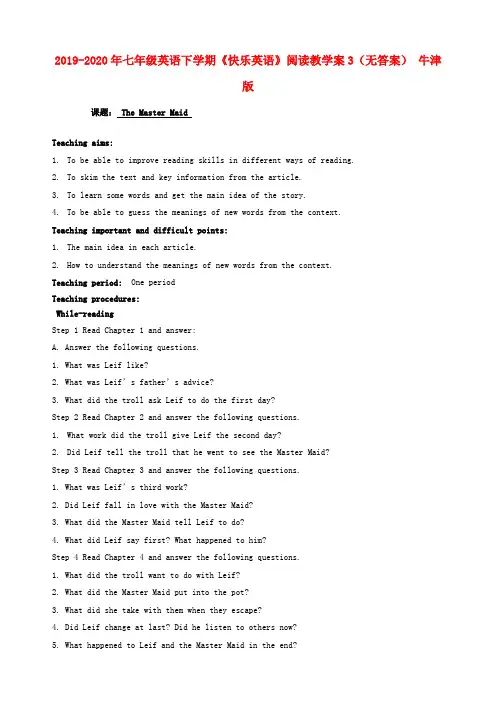
2019-2020年七年级英语下学期《快乐英语》阅读教学案3(无答案)牛津版课题: The Master MaidTeaching aims:1.To be able to improve reading skills in different ways of reading.2.To skim the text and key information from the article.3.To learn some words and get the main idea of the story.4.To be able to guess the meanings of new words from the context.Teaching important and difficult points:1.The main idea in each article.2.How to understand the meanings of new words from the context.Teaching period: One periodTeaching procedures:While-readingStep 1 Read Chapter 1 and answer:A. Answer the following questions.1. What was Leif like?2. What was Leif’s father’s advice?3. What did the troll ask Leif to do the first day?Step 2 Read Chapter 2 and answer the following questions.1.What work did the troll give Leif the second day?2.Did Leif tell the troll that he went to see the Master Maid?Step 3 Read Chapter 3 and answer the following questions.1. What was Leif’s third work?2. Did Leif fall in love with the Master Maid?3. What did the Master Maid tell Leif to do?4. What did Leif say first? What happened to him?Step 4 Read Chapter 4 and answer the following questions.1. What did the troll want to do with Leif?2. What did the Master Maid put into the pot?3. What did she take with them when they escape?4. Did Leif change at last? Did he listen to others now?5. What happened to Leif and the Master Maid in the end?B. Decide the following questions whether they are true or false. If it is true, write “T”, if it is not true, please write “F”.1. Leif is a lovely and handsome fellow, but he was stubborn. ( )2. Leif was not afraid of the troll, so he went to work for him. ( )3. The work the troll gave Leif was very easy to do. ( )4. Leif wanted to keep some silver and gold. ( )Step 4 Exercises: pletes the exercises on P59.Post-readingStep 5 Key Excerpt1.Translate the following wonderful phrases (精彩短语)1. Do things his own way,2. make up your own mind3. knock on the door4. the next morning5. neat and tidy6. keep me away from you7. one more day8. as much as …9. as soon as10.after some timeWonderful sentences (精彩句子)1. But he never wanted to listen to anyone, and he did things his own way.2. Your stubbornness is sure to bring you trouble.3. Right to the house the troll.4. The only way to get to the dream factory is by sock.5. I’ll make an end of you.6. In a few seconds he was nearly buried, but the treasure kept ing.2.Wonderful paragraphs (精彩段落)In no time, Leif got the bridle off his shoulder and held it before him. The horse stopped, as tame as you can imagine, and Leif bridled it and rode it back to the stable.As soon as he said that, silver and gold came out of the mountain and piled up around him. In a few moments he was nearly buried, but the treasure kept ing.3.“Summary of the content (内容梗概)Leif was a lovely and handsome fellow. But he wanted to listen to anyone, and he always did things his own way. He didn’t listen to his father’s advice and went to work for the troll. There he met the Master Maid. With the help of her, Leif finished the work the troll gave him. During the time they fell in love with each other. They escape from the troll at last and they got married, lived a happy life.4. Questions and insightsQuestions after reading1. Can we be very stubborn in our daily life?2. What should we do when we are in trouble?Insights after readingWe should not be very stubborn in our daily life. It’s very good for us to listen to others and follow the advice they offer. When we are in trouble, we can ask others for help.2019-2020年七年级英语下学期《快乐英语》阅读教学案4(无答案)牛津版课题: The Frog PrinceTeaching aims:1.To be able to improve reading skill in different ways of reading.2.To skim the text and key information from the articles.3.To learn some words and their stories.4.To be able to guess the meanings of new words from the context.Teaching important and difficult points:1.The main idea in each article.2.How to understand the meanings of new words from the context.Teaching period: One periodTeaching procedures:While-readingStep 1 Read and answer:A. Answer the following questions.1.What was the princess’ favourite playing?2.What happens to the princess’ ball?3. Why did the princess weep so bitterly?4. What did the frog want to do after he helped the princess?5. Did the princess take the frog with her as she said?B. Decide the following questions whether they are true or false. If it is true , write “T”, If it is not true , please write “F”.1.The frog didn’t find the ball.( )2.The princess was unwilling take the frog in her hand, and put him upon the pillow of her own bed, where he slept all night long. ( )3. The prince said ,’I have something to wish for but that you shouldn’t go with me into my father's kingdom, where I won’t marry you, and love you as long as you live.”( )4. when the princess awoke on the following morning she found a handsome prince.( )5. Then the king said to the young princess, 'As you have given your word you must keep it; so go and let him in.'. ( )Step 4 Exercises: pletes the exercises on P18.Post-readingStep 5 Key Excerpt5.Wonderful phrases (精彩短语)1. take a walk by herself2. Weep so bitterly3. put its head out of the water4. get out of the spring5. after a little while6. be able to7. on the side of the spring8. as fast as she could9. in the greenwood shade10. full of joy and excitement6.Wonderful sentences (精彩句子)(1). 'As you have given your word you must keep it; so go and let him in.',“君子一言,驷马难追,你应该让他进来。
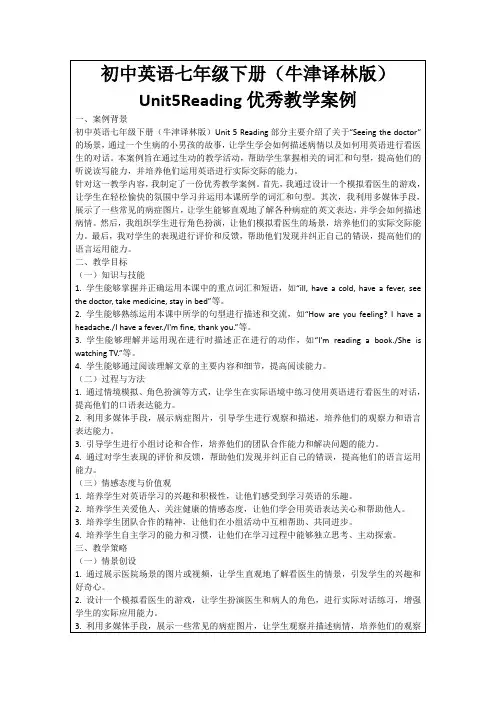
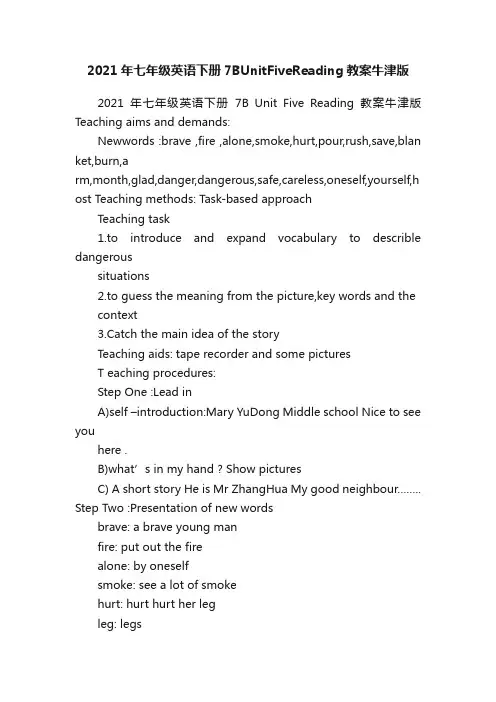
2021年七年级英语下册7BUnitFiveReading教案牛津版2021年七年级英语下册7B Unit Five Reading教案牛津版Teaching aims and demands:Newwords :brave ,fire ,alone,smoke,hurt,pour,rush,save,blan ket,burn,arm,month,glad,danger,dangerous,safe,careless,oneself,yourself,h ost Teaching methods: Task-based approachTeaching task1.to introduce and expand vocabulary to describle dangeroussituations2.to guess the meaning from the picture,key words and thecontext3.Catch the main idea of the storyTeaching aids: tape recorder and some picturesT eaching procedures:Step One :Lead inA)self –introduction:Mary YuDong Middle school Nice to see youhere .B)what’s in my hand ? Show picturesC) A short story He is Mr Zh angHua My good neighbour…….. Step Two :Presentation of new wordsbrave: a brave young manfire: put out the firealone: by oneselfsmoke: see a lot of smokehurt: hurt hurt her legleg: legspour: pour water over his jacketrush: run away quicklysave: keep sb.safe from dangersaveddanger(n): dangerous(adj.)safe: dangerous(adj.)careless:not carefulblanket: with a blanketburn: burntarm: armsmonth: two monthsglad: happyhost:CaoKefan is a host of STVLet students read vocabulary by themselvesStep Three: Main idea of the storyDo you want to know more about the fire happened in Mrs Sun’s ktchen ?Please listen to the tapeA Questions1.Did ZhangHua go out on May the tenth?2.Was there a fire in the kitchen?3.Was there a lot of smoke?4.Did ZhangHua run out of the building?5.Did the fire burn ZhangHua?6.How long did he stay in hospital ?B Read the story carefully,then answer the following1.What happened on 10th May ?2.Who saved Mrs Sun ?3.Why couldn’t Mrs Sun get out of the fire?4.How did ZhangHua put out the fire?5.Why was ZhangHua in hospital?Step Four Read and Ask questions by studentsStep Five Practice (classwork)Step Six Homework1.Read the story skillfully,learn the new words by heart.2.Finish exercises at page 79 B1 B2附:课堂检测题基础训练Ⅰ、英汉互译()4、The little boy is cutting the wood a knife .1、扑灭火2、冲进A. useB. usesC. usingD. with3、互相帮助4、hear someone calling for help Ⅳ、根据课文内容判断正(T)误(F)5、happen to her6、be careful with fire ()1、Zhang Hua is 20 years old . He is a very brave young man .7、做…很重要8、pour water over the jacket()2、One 10th May , Zhang Hua was at home with her parents .9、独自地10、(生病)住院()3、When he ran outside , he saw a lot of smoke from next door .11、一位8岁的男孩()4、His neighbour was an old woman .Ⅱ、用所给单词的适当形式填空()5、Mrs Sun couldn`t get out because she hurt his arm .1、Simon hurt his leg . He was very (careful) . ()6、Zhang Hua put on her jacket and rushed into Mrs Sun`s kitchen .2、We should practise (read) English every day . ()7、He put out the fire with a blanket and helped Mrs Sun out .3、Thank you for (give) a seat to me . ()8、Zhang Hua was badly hurt , so he had to stay in hospital for 2months.4、It`s easy (finish) the work . Ⅴ、选择题5、She heard someone (shout) ,“Fire ! Fire !”. ()1、Where was Mrs Sun when the fire happened ?6、The fire is very (danger) . We must be careful with it .A. She was in the bedroomB. She was in the street7、Now Zhang Hua is out of (dangerous) .C. She was in the kitchen8、The fire (burn) the whole building . ()2、How did Zhang Hua put out the fire at last ?。
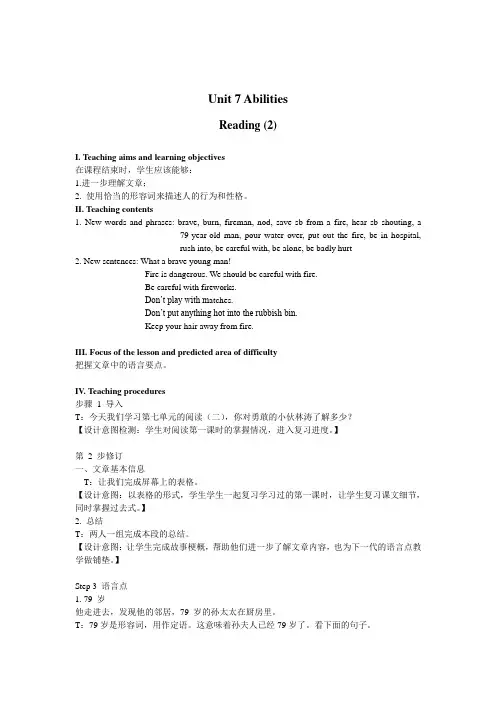
Unit 7 AbilitiesReading (2)I. Teaching aims and learning objectives在课程结束时,学生应该能够:1.进一步理解文章;2. 使用恰当的形容词来描述人的行为和性格。
II. Teaching contents1. New words and phrases: brave, burn, fireman, nod, save sb from a fire, hear sb shouting, a79-year-old man, pour water over, put out the fire, be in hospital,rush into, be careful with, be alone, be badly hurt2. New sentences: What a brave young man!Fire is dangerous. We should be careful with fire.Be careful with fireworks.Don’t play with m atches.Don’t put anything hot into the rubbish bin.Keep your hair away from fire.III. Focus of the lesson and predicted area of difficulty把握文章中的语言要点。
IV. Teaching procedures步骤1 导入T:今天我们学习第七单元的阅读(二),你对勇敢的小伙林涛了解多少?【设计意图检测:学生对阅读第一课时的掌握情况,进入复习进度。
】第2 步修订一、文章基本信息T:让我们完成屏幕上的表格。
【设计意图:以表格的形式,学生学生一起复习学习过的第一课时,让学生复习课文细节,同时掌握过去式。
】2. 总结T:两人一组完成本段的总结。
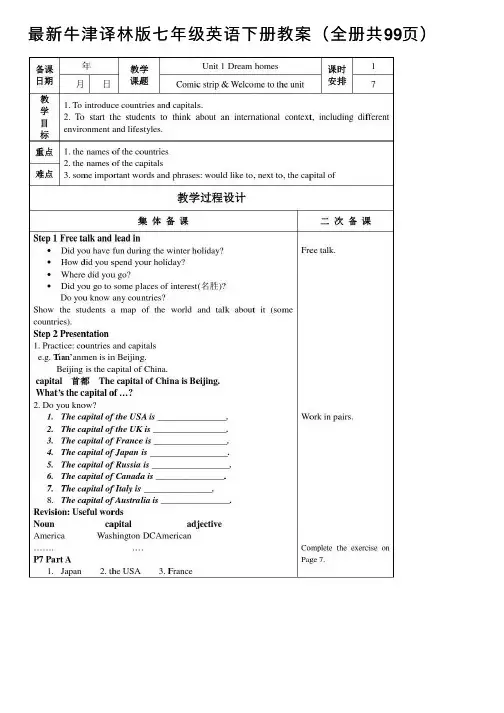
最新⽜津译林版七年级英语下册教案(全册共99页)Step 1Talk about cardinal numbersAsk Ss to remember where they can find numbers in their lives. Give pictures about numbers in our lives.Ask Ss to read page numbers, room numbers, student numbers…1 章节,页数的读法第三课the Third Lesson, Lesson Three第507页Page five o seven第2564页Page two five six four /Page twenty-five sixty-four2房间,门牌,电话号码的读法第305房间Room three o five长安街76号seventy-six Chang‘an Street电话号码204486 telephone number, two o four four(double four) eight six.⼗⼀路公共汽车Bus (No.) elevenReview numbers from 1 to 100, and give Ss some simple maths problems to plus and minus.Step 2 Talk about the spelling0 --- 19 zero --- nineteen21 --- 99 twenty-one --- ninety-nine20, 30, 40, 50, 60, 70, 80, 90twenty ………ninetyPay attention!(1) –teen重⾳在―teen‖上;-ty重⾳在单词开头;(2) 特殊变化:13/15/18/30/40/80;(3) 表⽰―⼏⼗⼏‖的数词中有―-‖,如twenty-two, thirty-five等。
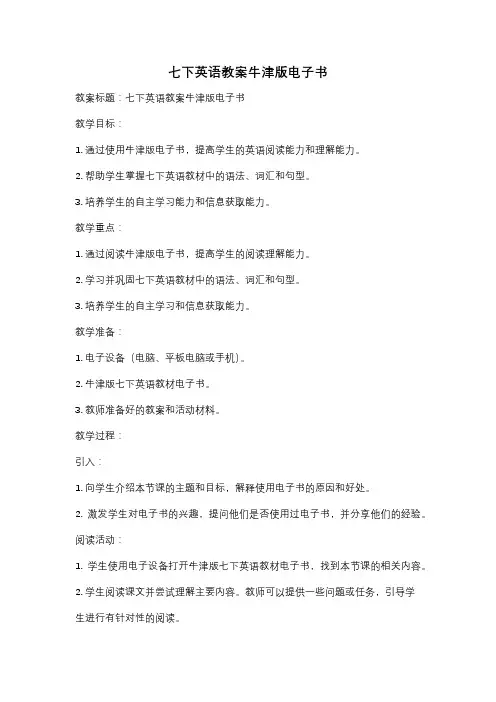
七下英语教案牛津版电子书教案标题:七下英语教案牛津版电子书教学目标:1. 通过使用牛津版电子书,提高学生的英语阅读能力和理解能力。
2. 帮助学生掌握七下英语教材中的语法、词汇和句型。
3. 培养学生的自主学习能力和信息获取能力。
教学重点:1. 通过阅读牛津版电子书,提高学生的阅读理解能力。
2. 学习并巩固七下英语教材中的语法、词汇和句型。
3. 培养学生的自主学习和信息获取能力。
教学准备:1. 电子设备(电脑、平板电脑或手机)。
2. 牛津版七下英语教材电子书。
3. 教师准备好的教案和活动材料。
教学过程:引入:1. 向学生介绍本节课的主题和目标,解释使用电子书的原因和好处。
2. 激发学生对电子书的兴趣,提问他们是否使用过电子书,并分享他们的经验。
阅读活动:1. 学生使用电子设备打开牛津版七下英语教材电子书,找到本节课的相关内容。
2. 学生阅读课文并尝试理解主要内容。
教师可以提供一些问题或任务,引导学生进行有针对性的阅读。
3. 学生可以使用电子书的功能,如调整字体大小、标记重要内容等,以提高阅读效果。
语法和词汇练习:1. 教师提供一些与本节课内容相关的语法和词汇练习题,让学生巩固所学知识。
2. 学生可以使用电子书中的搜索功能,快速找到相关内容并解答问题。
3. 教师可以组织小组活动或竞赛,增加学生的互动和参与度。
拓展活动:1. 学生可以使用电子书中的链接或搜索功能,查找更多与本节课内容相关的资料,扩展知识面。
2. 学生可以使用电子书中的笔记功能,记录重要内容或个人理解。
3. 学生可以使用电子书中的朗读功能,提高听力和口语能力。
总结:1. 教师对本节课的教学进行总结,强调学生通过使用牛津版电子书提高了阅读和理解能力。
2. 鼓励学生在课后继续使用电子书进行自主学习和复习。
教学评估:1. 观察学生在课堂上的参与度和阅读效果。
2. 收集学生完成的练习和活动材料,评估他们对本节课内容的掌握程度。
3. 针对学生的表现和反馈,调整教学策略和活动安排。
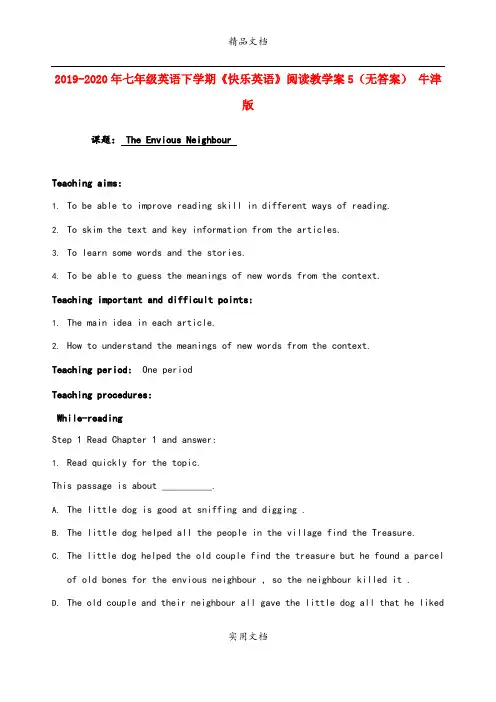
2019-2020年七年级英语下学期《快乐英语》阅读教学案5(无答案)牛津版课题: The Envious NeighbourTeaching aims:1.To be able to improve reading skill in different ways of reading.2.To skim the text and key information from the articles.3.To learn some words and the stories.4.To be able to guess the meanings of new words from the context.Teaching important and difficult points:1.The main idea in each article.2.How to understand the meanings of new words from the context.Teaching period: One periodTeaching procedures:While-readingStep 1 Read Chapter 1 and answer:1.Read quickly for the topic.This passage is about __________.A.The little dog is good at sniffing and digging .B.The little dog helped all the people in the village find the Treasure.C.The little dog helped the old couple find the treasure but he found a parcelof old bones for the envious neighbour , so the neighbour killed it .D.The old couple and their neighbour all gave the little dog all that he likedto eat best.2.Read carefully for more information.Write a T if the sentence is true , write an F if it is false.( ) a. One day the old man was working in his garden with his dog.( ) b. The dog was happy because the old man gave him a lot to eat.( ) c. The dog helped his master find a large box of gold pieces.( ) d. The old couple’s neighbour helped them look after the dog because he loved the dog.( ) e. One day , the dog suddenly fell down dead although the neighbour looked after him well .Step 2 Read Chapter 2 and plete.1.Read quickly for the topic.This passage tells us _________.A.The old man made a mortar out of the fig tree after he head a dream about hisdog. The mortar helped them got some gold again.B.The little dog helped the old couple make a beautiful mortar out of the fig tree.C.The envious neighbour made a beautiful mortar by himself and found gold too.D.The old couple and their neighbour gathered the rice crop together.2.Read carefully for more information(1) ( ) Why did the old man cut down the fig tree to make a mortar?A. The tree was too old to bear any more.B. His little dog came back to help the old man .C. In the old man’s dream , his little dog told him to do so.D. The wife of the old man told him to do so .(2) ( ) What did the envious neighbour do when his rice in the mortar turned in to terrible berries ?A. He lent the mortar to the old couple .B. He cut the mortar into pieces.C. He broke the mortar and burnt the pieces.D. He went off with the mortar under his arm .3. Read Chapter 3 and answer the following questions.A. Read quickly for the topic.What’s the topic of the passage ?A.The old man did as his dog in the dream told him to do and got many presentsfrom the king .B.The old man collected the ashes of the burnt mortar and bring them home .C.The old man made the trees have flowers in winter .D.The envious neighbour sprinkled the ashes into the eyes of the king.B. Read carefully for more information.1. ( ) In the dream his master to collect the ashes of the mortar , sprinkle them on the cherry trees when the king came, and the trees would soon blossom.B. The little dog told his master to collect the ashes and sprinkle them into his neighbour eyes.C. The little dog helped his master catch the neighbour and put him into prison.D. The little dog asked the people in the village to drive the envious neighbours away .2. ( ) What happened when the envious neighbours sprinkled the ashes ?A. The white flowers burst into life on the trees .B. Lots of buds and flowers followed the action .C. The ashes were blown back into the eyes of the king and his warriors.D. The ashes were blown into his own eyes.Post-readingWonderful phrases (精彩短语)A.1. go on with his digging2. be out of our sight3.be filled with anger4.be willing to do sth.5.burst into life6. a great handful of riceWonderful sentences (精彩句子)1.The dog was so happy at his success that he jumped around , barking loudly .2.He could neither eat nor sleep .3.The dog ran up to the foot of a tree, and began to dig wildly .4.At the sight of all , the gold , the old couple were glad , once more they blessed their faithful dog.5.The moment the man got into his own house , he took a great handful of rice and put it into the mortar.6.As soon as the king was in sight , he should climb up all the cherry trees to sprinkle the ashes on them.Wonderful paragraphs (精彩段落)A. Long long ago, an old couple lived in a village with a little dog. They hadno children so they gave all their love to a little dog. One day , the dog helped his master find some treasure in their garden when envious neighbour heard the story , he begged the old couple to lend him the dog, so that he might also be rich, while the dog helped him find nothing but a parcle of bones , the neighbour killed the dog in anger.Afterwards , the dog appeared to the old man in his dream, told him to cut down the fig tree over his grave to make a mortar out of its wood . When the harvest season came, the mortar turned the grains into gold . This time , the envious neighbour borrowed the mortar, but it didn’t bring him any treasure , he broke the mortar and burnt the pieces.Again the dog appeared to his master in his dream he told the old man to collect the ashes of the mortar and when the king came, the old man sprinkled the ashes on the trees , the flowers burst into life at once in winter. The king was happy and gave many presents to the old man .The envious neighbour did what the old man had done, but the ashes were blown into the eyes of the king and his warriors . He was caught and put into prison.B. This time the old man did not wait to ask his wife. Instead(作为代替), he went straight to his neighbour’s house and collected the ashes of the burnt mortar. He put them carefully in a china vase(花瓶) and carried it to the high road. There he waited for the king. At this time of the year , trees usually did not have flowers .When the king came, he climbed the nearest cherry trees and threw the mortar’s ashes far and wide, and in a moment the white flowers burst into life. The king was very happy, so he gave many presents to the old man.Questions and insights1.Questions after reading.A.What did the story of the old couple and their dog want to tell us ?B.What did the story of the envious neighbour try to warn us ?2.Insight after readingThe story tells us that we should be kind to the people around us and love them , but we aren’t expected to get rewards from them .If someone is evil and envious , he will be punished in the end.24619 602B 怫38653 96FD 雽36952 9058 遘38291 9593 間29446 7306 猆23641 5C59 屙28553 6F89 澉a34273 85E1 藡s\p7 38207 953F 锿。
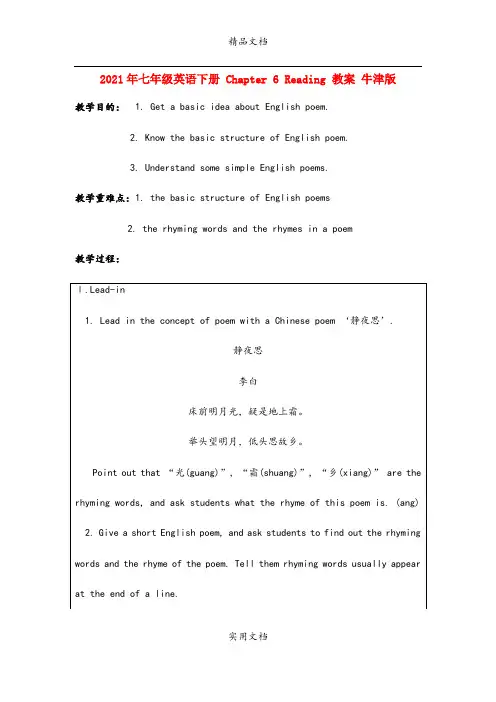
2021年七年级英语下册 Chapter 6 Reading 教案牛津版教学目的: 1. Get a basic idea about English poem.2. Know the basic structure of English poem.3. Understand some simple English poems.教学重难点:1. the basic structure of English poems2. the rhyming words and the rhymes in a poem教学过程:One, Two, Three, Four, FiveOne, two, three, four, five,Once I caught a fish alive;Six, seven, eight, nine, ten,The I let him go again.Why did you let him go?Because he bit my finger so.Which finger did he bite?This little finger on the right.3. Show students some poems and ask students how they feel when they read these poems. (The Chinese one is quiet, and the English one is lively.)Ⅱ. Never a dull momentⅰ. Pre-reading1. Play some sounds and ask students to guess what they are.baby crying, dog barking, man singing, boy shouting Ask students where they can hear such sounds. (At home.) Lead to the poem ‘Never a dull moment’.2. First look at the picture. “How do you think the family is?”(Noisy.)3. Look at the poem without reading it. Ask students how many parts the poem has. (6.) Tell them each part of the poem is called a stanza or a verse.ⅱ. ListeningListen to the recording with the book closed and answer the questions following.1. How many people are there in the family? Who are they?(8. My dad, my mum, the baby, our dog, my sister, my brother, my grandpa and I.)2. How do you feel when you hear the poem?ⅲ. Detailed-readingRead the poem carefully and answer the questions.1. Find out the rhyming words and the rhyme of each verse.2. Find out who is slamming the door and why?(My grandpa. Because he is stone deaf.)3. The speaker in the poem says it is the noisiest house. Read the poemand make a list of all the noisy words.Example: knock, slamming(falling down, shouting, breaks things, cries, roars, slams, racket, din)4. Who is the speaker of this poem in the picture?(The boy standing quietly and watching what the others are doing.)ⅳ. Post-reading1. What does the poet want to express(表达) in this poem?His house is always very lively and he never gets bored.2. Read the poem aloud with feeling.Ⅲ. Some daysⅰ. Pre-reading1. Tell the class that not every day is full of excitement, and maybe someday they will find life boring. Ask students what they will do if they fill bored. Lead to the poem ‘Some days’.2. Look at the picture in the book and answer questions below.1) The poem “Some days”will probably describe some days in our lives as b .a. excitingb. uninterestingc. busyd. lazy2) The speaker in the poem is probably a c .a. manb. womanc. boyd. girlⅱ. ListeningListen to the recording with the book closed and answer the questions following.1. How many things did the speaker do? (8)2. Which sentence repeats again and again? (I didn’t find it interesting.)3. How do you feel when you hear the poem?ⅲ. Detailed-readingRead the poem carefully and answer the questions.1. Find out the rhyming words and the rhyme of each verse.2. What were the eight things the boy did?Example: listening, talking(Walking, reading, writing, watching TV, sitting and sleeping.)3. Why did the boy do so many different things?(Because he was bored.)4. Did the time pass slowly or quickly for the boy?5. A line from the poem ‘Some days’ would also be a good title for the poem. Find this line.(A dull old day.)ⅳ. Post-reading1. What does the poet want to express(表达) in this poem?We may feel unhappy some days in our life. Some days are very boring.2. Read the poem aloud with feeling.Ⅳ. Let’s pare (group word)Choose the words belo w to describe ‘Never a dull moment’ and ‘Some days’.Beautiful, unhappy, funny, crowded, lively, boring, angry, quiet, noisy, slow, fast, sadⅤ. Sum-upThe basic structure of English poem: 1. line, verse2. rhyming word (usually at the end of a line)Listening教学目的: Do a proofreading task of a poem about a typhoon.教学重难点:Find out the mistakes and correct them.教学过程:Language教学目的: 1. Use ‘who’ and ‘whose’ to talk about family members.2. Use ‘one’ and ‘ones’ to replace countable nouns.教学重难点:when to use and which one to use教学过程:Who is your best friend in the class?Whose eyes are the most beautiful?Ⅱ. UsageStudents summarize the usages of who and whose.1. who: “谁”,对句子中的主语提问。
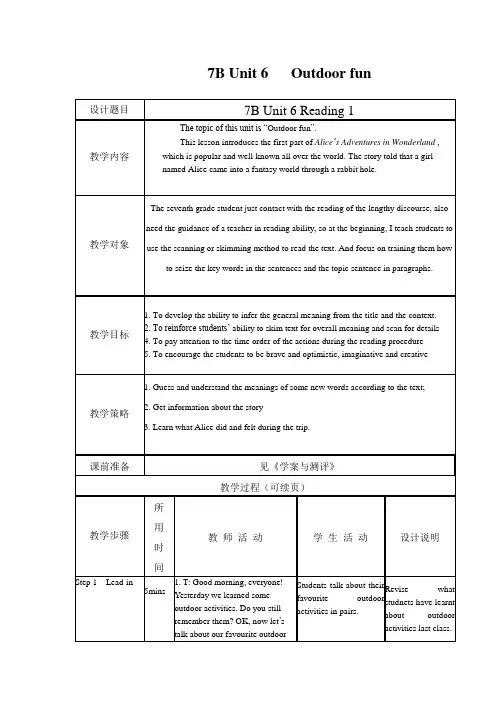
7B Unit 7 Reading 教案Step 1:New Words:1.Learn some new words after the pictures.2.Read the new words together.3. Match the words on the left with the meaning on the right.Step 2 Lead-in:1.What can we use it for?2. If there is a fire, what should we do?Step 3 Pre-reading:What happened to the little boy?Step 4 While-reading:1.Now let’s watch a flash and the question:What did the young man do?2.Fast reading: Now please read the story on your own, and decide whether the following statements are true or false.3.Detailed reading:Read the story to find the answers.Step 5 Consolidation:Read the text together and fill in the blankets.Lin Tao is a b______young man.He s_____his neigbour Mrs.Sun from a f_____.On 10th May,he was at home a_______. Suddenly he heard someone s______‘Fire!Fire!’he saw a lot of s______ from n____ ____.He p_____ water over his clothes to protect himself.Then he r_____ into his neighbour’s kitchen and put a wet b_____over her. He helped her out.But the fire b____ him. He was __ _____ for two weeks. Many visitors g_____ him some flowers and Lin Tao said that fire can be very d________. It is i_____ to be ______ with fire.Step 6 Play a game:Choose the letter and then tell true or false statements:Step 7 Disscusion:What can we learn from Lin Tao?Proverb(谚语):To help others is to help ourselves!帮助别人就是帮助自己!Step 8. Homework:1.Retell the text of reading2.Do Part B1 and Part B3 on Page 83-84.。
2019-2020年七年级英语下学期《快乐英语》阅读教学案3(无答案)牛津版课题: The Master MaidTeaching aims:1.To be able to improve reading skills in different ways of reading.2.To skim the text and key information from the article.3.To learn some words and get the main idea of the story.4.To be able to guess the meanings of new words from the context.Teaching important and difficult points:1.The main idea in each article.2.How to understand the meanings of new words from the context.Teaching period: One periodTeaching procedures:While-readingStep 1 Read Chapter 1 and answer:A. Answer the following questions.1. What was Leif like?2. What was Leif’s father’s advice?3. What did the troll ask Leif to do the first day?Step 2 Read Chapter 2 and answer the following questions.1.What work did the troll give Leif the second day?2.Did Leif tell the troll that he went to see the Master Maid?Step 3 Read Chapter 3 and answer the following questions.1. What was Leif’s third work?2. Did Leif fall in love with the Master Maid?3. What did the Master Maid tell Leif to do?4. What did Leif say first? What happened to him?Step 4 Read Chapter 4 and answer the following questions.1. What did the troll want to do with Leif?2. What did the Master Maid put into the pot?3. What did she take with them when they escape?4. Did Leif change at last? Did he listen to others now?5. What happened to Leif and the Master Maid in the end?B. Decide the following questions whether they are true or false. If it is true, write “T”, if it is not true, please write “F”.1. Leif is a lovely and handsome fellow, but he was stubborn. ( )2. Leif was not afraid of the troll, so he went to work for him. ( )3. The work the troll gave Leif was very easy to do. ( )4. Leif wanted to keep some silver and gold. ( )Step 4 Exercises: pletes the exercises on P59.Post-readingStep 5 Key Excerpt1.Translate the following wonderful phrases (精彩短语)1. Do things his own way,2. make up your own mind3. knock on the door4. the next morning5. neat and tidy6. keep me away from you7. one more day8. as much as …9. as soon as10.after some timeWonderful sentences (精彩句子)1. But he never wanted to listen to anyone, and he did things his own way.2. Your stubbornness is sure to bring you trouble.3. Right to the house the troll.4. The only way to get to the dream factory is by sock.5. I’ll make an end of you.6. In a few seconds he was nearly buried, but the treasure kept ing.2.Wonderful paragraphs (精彩段落)In no time, Leif got the bridle off his shoulder and held it before him.The horse stopped, as tame as you can imagine, and Leif bridled it and rode it back to the stable.As soon as he said that, silver and gold came out of the mountain and piled up around him. In a few moments he was nearly buried, but the treasure kept ing.3.“Summary of the content (内容梗概)Leif was a lovely and handsome fellow. But he wanted to listen to anyone, and he always did things his own way. He didn’t listen to his father’s adviceand went to work for the troll. There he met the Master Maid. With the help of her, Leif finished the work the troll gave him. During the time they fell in love with each other. They escape from the troll at last and they got married, lived a happy life.4. Questions and insightsQuestions after reading1. Can we be very stubborn in our daily life?2. What should we do when we are in trouble?Insights after readingWe should not be very stubborn in our daily life. It’s very good for us to listen to others and follow the advice they offer. When we are in trouble, we can ask others for help.35578 8AFA 諺29773 744D 瑍zS40405 9DD5 鷕h440851 9F93 龓B26201 6659 晙+39065 9899 颙Z37641 9309 錉O。
2019-2020学年七年级英语下册U nit5精品教学案(共10课时)牛津译林版课题7B Unit 5 Comic strip and Welcome to the unit知识目标通过漫画引出谈论能力的话题。
学习目标能力目标谈论在日常生活中我们能为他人所做的事情。
情感目标通过谈论如何关心和帮助他人进行思想品德教育。
学习重点认读新词;理解、运用新句型及其回答;发言时发音正确,语音语调准确。
学习难点句型what can you do in the park/in the school/on the bus/on the road …?的灵活运用及回答。
课前自学一、在课本76页和77页找出并翻译下面的词、词组和句子。
词:abilityseatcollectelderly词组:be careful plant treesclean upgive a seat to sbon the buscollect things forProject Hopea home for the elderly旬型:1) How cool !2) Be careful . 3) I can fly !4) You can't fly. 将下列短语英汉互译。
1. b e careful 2. 放风筝3.plant tree4. 帮助一位老人5. g ive a seat to someone6. 打扫公园7.Project Hope8. 拜访老人之家9.c ollect stamps 10. 照顾二、朗读书本77页词汇框内词组,不理解或不会读的单词可以组内合作探讨一下,然后完成此部分习题。
三、朗读第76页comic strip 部分的内容,可要注意语音语调哦!四、你看过美国电影《超人》吗?你认为他能做的事的后面写"Yes " , 不能做的后面写"N o "。
1. Mr. Superman can fly in the sky.2. Mr. Superman can help everyone who is in trouble.3. Mr. Superman can change into different appearances.课堂交流展示一、预习情况交流。
2021-2021学年牛津深圳版英语七年级下册全册教案Unit 1 People around us 教案课题:Unit 1 --- People around us (阅读课) 课时:第 1 课时,共4课时课型: new words 教学目标:1.To know the meaning of the new words and the students can use the words to make sentences.2.To train the students’ ability of cooperation.教学重点: The pronunciation and the usages of the new words: cheerful , hard-working , patient, person, smart, forget, smell , strict, encourage, remain , support successful, remember.教学难点: The usages of the new words: forget , remember , patient , strict, remain , strict.教学准备: e some pictures and games and PPT .2.a recorder .教学步骤:Step 1 Warming up. Freely talk: who do you like best around you ?show some pictures of teacher,father ,mother,friend, on the PPT to talk about them. Step 2 New words.1.Read the new words after the teacher or the tape.2.Group work to remember the new words3.Help the students when they have trouble in reading the new words Step 3 Key words learning.1.Show the PPT of the meaning of the key words for them to finish Part A1.2. Let Ss make more sentences with the new words . Step 4 Have a competitioncheck the words and give them marks for the groups step5 ReadingBefore reading : 1.Ask Ss to look at the pictures and the titles of the three articles on page 3.2.Check their answers.While reading : 1.Read the article quickly, and then finish Part D1.2. Check their answers.Post reading: 1.Ask Ss to finish Part C1 and C2. 2. Check their answers. Step 6 Reciting the article1.Play the tape for them to listen and repeat.2.Show PPT for themto retell the article. ExercisesTo consulate the usages of the new words step 7 SummaryGive them a piece of paper to write the words. Step 8 Homework 1.Dictation2.correct the mistakes Step9 The blackboard designUnit 1 People around us1. be cheerful快乐2.as well 也3.take care of 照顾4.tell jokes 讲笑话5.make sb laugh 使某人发笑6.be good at 擅长于?7.be strict in sth 对某事严格要求 be strict with sb对某人严格要求课题:Unit 1 People around us (听说课) 课时:第2课时,共 4 课时课型:Listening & Speaking 教学目标:1.Learn how to use the new words or phrases to describe a person2.improve their listening and speaking skills 教学重点: To catch the missingwords when listening 教学难点: Learn to take note quickly when listening 教学准备: Group work. Self―study 教学步骤:Step 1: Prepare for the listening and speakingReview some words and phrases which can be used to describe a person Step2: Do the listening1.Play the listening materials , stop when necessary2.Check the answersStep3.SpeakingGive a sample dialogue to students and ask them to imitate it Step 4:Make notes about the listening. 1. Tell them to find the key words.2. Write down the key words you get in the listening part. Step5 Speaking1.学习双元音/i?/、 /e?/、/u?/1)Read after the teacher or the tape. 2)Read by themselves.2.Listen to the tape and finish A1 then check their answers.3.Learn A2. Ask Ss to read these sentences. Pay attention to the lettersin red. 4.Speaking upWork in groups to discuss the people they like . S1: Who do you like? S2: I like ?S1: What does/did he/she look like? ?Step6:Sum up Step7HomeworkStep8 The blackboard design Unit 1 People around us 1.描写人的外貌的词 2. 双元音/i?/、 /e?/、/u?/课题:Unit 1 People around us(语法及运用课)课时:第3时,共 4 课时课型:Grammar 教学目标:1.to grasp the usage of the definite word the and the preposition with2. to raise the students’ ability to sum up some language rules 教学重点: Know when should use the in front of a noun and when we should not use it and the usage of the with phrases to describe a person 教学难点: When we should not use the in front of a noun. 教学准备:PPT, Blackboard 教学步骤:Step1:Free talkTalk about the noun with an, a and the . Step2: WritingBefore writing: Give Ss the title of the article to talk about. 1. Who are you going to write about? 2. Think about the following ideas. 1)a family member 2)a good friend3)a teacher or a great person While writing:1.Write a short article about this person.Show some PPT to help them to write the article.2.介绍一些描述人常用的词汇.3. Ask Ss to read “My dad”as an example. Step3:More practiceAsk Ss to read the article about Mother’s Day quickly.Then answer the questions.1.When is Mother’s Day?2.What do people like to do this day?3.What do the author advise people to do on this day? Step4 Study skills1.Learn line graphs and bar charts to show the change in numbers.2.Fill in the blanks.3.Check their answers. Step 4:Culture corner1.Introduce middle names for Ss.2.Write some famous people’s middle names. Step5:Sum up1.Go over the rules of the Step6: HomeworkStep7 The blackboard design 1.冠词“a\\an”的用法。
2019-2020年七年级英语下学期《快乐英语》阅读教学案7(无答案)牛津版课题: Sid the kid and his lost imaginationTeaching aims:1.To be able to improve reading skill in different ways of reading.2.To skim the text and key information from the articles.3.To learn some words and the stories.4.To be able to guess the meanings of new words from the context. Teaching important and difficult points:1.The main idea in each article.2.How to understand the meanings of new words from the context. Teaching period: One periodTeaching procedures:While-readingStep 1 Read Chapter 1 and answer:1. What Grade is Sid in?2. Why does Kid love going to school ?3. Did Kid know what an imagination was?Step 2 Read Chapter 2 and do T or F.1.In fact Kid’s teacher mailed his imagination to him. ( )2.Kid didn’t want his parents know that he lost his imagination. ( )3.Kid had no idea why the mailman thought his words was funny .( )Step 3 Read Chapter 3 and answer the following questions.1.Did Kid have his flashlight when he was in the cave?2.Why wasn’t he too afraid?Step 4 Read Chapter 4 and translate some sentences.1.I felt pretty safe when I opened the door.______________________________________________.2.I couldn’t open my eyes but could feel wind on my face._______________________________________________.3.It took me a minute to realize what just happened._______________________________________________.Post-readingStep 5 Underline the following phrases in Chapter 5 and translate.1.take her advice_____________________2.give up___________________________3.look at me in surprise________________4.lie on the sofa______________________5.at the feet of the Queen_______________6.turn back__________________________Step 6 Read Chapter 6 and answer:1.Did Sid find his imagination at last?2.Who helped Sid find his imagination?Key Excerpt1.Wonderful phrases (精彩短语)1.have no idea2.take a lot of pride inugh at4.figure it out on my own5.decide to do6.feel a little better7.as soon as8.say hello to9.get out of10.sound like11.this whole search for my imaginationst but not least13.move to14.be afraid15e up with16.allow sb. to do17.be able to18.be supposed toWonderful sentences (精彩句子)1.It is frustrating to look for something when you don’t even know what it looks like.2.I looked around at everyone else but no one seem to care about it.3.I try hard to find my imagination.4.The first thing I did was to look under my bed, but the craziest thing happened.5.I guess my imagination was not there because I looked around as fast as I could.6.For now, I was back in my room safe and but still had no imagination.7.I wasn’t exactly sure what an imagination even looked like.8.I can’t believe my imagination was with me this whole time.2.Wonderful paragraphs (精彩段落)1)I was afraid. I have no idea what an imagination was. I have heard the word many times but never really took the time to understand what it meant.I looked around at everyone else but no one seem to care about it. I decided not to ask anyone about it. I didn’t want anyone to laugh at me for not knowing what an imagination is. So, I decided I would figure it out on my own.我害怕了,我不知道什么是想象力。
2019-2020年七年级英语下学期《快乐英语》阅读教学案4(无答案)牛津版课题: The Frog PrinceTeaching aims:1.To be able to improve reading skill in different ways of reading.2.To skim the text and key information from the articles.3.To learn some words and their stories.4.To be able to guess the meanings of new words from the context.Teaching important and difficult points:1.The main idea in each article.2.How to understand the meanings of new words from the context.Teaching period: One periodTeaching procedures:While-readingStep 1 Read and answer:A. Answer the following questions.1.What was the princess’ favourite playing?2.What happens to the princess’ ball?3. Why did the princess weep so bitterly?4. What did the frog want to do after he helped the princess?5. Did the princess take the frog with her as she said?B. Decide the following questions whether they are true or false. If it is true , write “T”, If it is not true , please write “F”.1.The frog didn’t find the ball.( )2.The princess was unwilling take the frog in her hand, and put him upon the pillow of her own bed, where he slept all night long. ( )3. The prince said ,’I have something to wish for but that you shouldn’t go with me into my father's kingdom, where I won’t marry you, and love you as long as you live.”( )4. when the princess awoke on the following morning she found a handsome prince.( )5. Then the king said to the young princess, 'As you have given your word you must keep it; so go and let him in.'. ( )Step 4 Exercises: pletes the exercises on P18.Post-readingStep 5 Key Excerpt1.Wonderful phrases (精彩短语)1. take a walk by herself2. Weep so bitterly3. put its head out of the water4. get out of the spring5. after a little while6. be able to7. on the side of the spring8. as fast as she could9. in the greenwood shade10. full of joy and excitement2.Wonderful sentences (精彩句子)(1). 'As you have given your word you must keep it; so go and let him in.',“君子一言,驷马难追,你应该让他进来。
2021年七年级英语下学期《快乐英语》阅读教学案12(无答案)牛津版课题: Henry and Jack: Across the Creek
Teaching aims:
1.To be able to improve reading skill in different ways of reading.
2.To skim the text and key information from the articles.
3.To learn some words and the stories.
4.To be able to guess the meanings of new words from the context.
Teaching important and difficult points:
1.The main idea in each article.
2.How to understand the meanings of new words from the context.
Teaching period: One period
Teaching procedures:
While-reading
Step 1 Read Chapter 1 and answer:
A. Answer the following questions.
1. What idea did Henry and Jack have after breakfast that day ?
2. Did Jack make the jump easily and soon he was on the other side of the creek?
Step 2 Read Chapter 2 and answer the following questions.
1.Did Henry make the jump and get to the other side at last ?
Step 3 Read Chapter 3 and answer the following questions.
1.Did Henry and Jack enjoy the berries?
2. Why did Henry want to choose some other ways to go back?
3.What did Henry and Jack do after climbing in their hole?
B. Decide the following questions whether they are true or false. If it is true , write “T”, If it is not true , please write “F”.
1. Henry and Jack were best friends.( )
2. Henry and Jack made the jump easily and got to the other side of the creek.
3. Jack encouraged Henry to get across the creek. ( )
3. Henry thought that was a small jump from one branch to the other. ( )
4. Henry was sure he could get to the other side.
5. Henry walked back to the branches and climbed on that shaky branch again with Jack . ( )
Step 4 Exercises: pletes the exercises on P86.
Post-reading
Step 5 Key Excerpt
1.Wonderful phrases (精彩短语)
1. make a small jump to that other branch
2. just move quickly
3. surely fall into the water
4. the branch ing at him
5. much sturdier than the first branch
6. really want a different way home
7. make a perfect bridge for sb
Wonderful sentences (精彩句子)
1. Henry and Jack lived in a big hole in the middle of a big tree out in the woods.
2. At this time of year the cheek was very full and very fast.
3. Finally, he pulled his legs up under him, and then jumped his best jump.
4. He took hold of it with his front paws, and then his back paws landed on it.
5. Henry couldn’t help smiling as he marched down the branch to solid ground.
2.Wonderful paragraphs (精彩段落)
1,Henry wasn’t sure he could do this, but he climbed to the first branch anyway. The first branch was shaky. The further he went out on the branch, the shakier it got. The shakiness made Henry very scared. Jack encouraged Henry,” You’re doing great, Henry. Keep going, Henry. You’re gonna make it, Henry” Henry liked the way his friend helped him.
2. Henry thought about Jack’s words for a long time. Finally, he pulled his legs up under him, and then jumped his best jump, Henry flew through the air. He saw the water below, and then he saw the branch ing at him. He took hold of it with his front paws and then his back paws landed on it.
3. Summary of the content (内容梗概)
Henry and Jack were two lovely field mice. They were best friends. One day, they wanted to go across the creek and picked some of berries. Jack made the jump easily and soon he was on the other side of the creek. Henry wasn’t sure he would make it. Jack encouraged him along time. At last, Henry passed the creek. They found the biggest berries they ever saw. On their way home, Henry found the tree was down
and lay right across the creek. They jumped right across the tree and reached their hole.
4. Insights after reading
You should have confidence to face the difficulty when we face difficulties. You should try a new method to do. Never give up whatever difficulty you meet. Eventually we can work out a solution. .
!m30602 778A 瞊35513 8AB9 誹22564 5824 堤20332 4F6C 佬21140 5294 劔27114 69EA 槪G,27030 6996 榖24266 5ECA 廊024435 5F73 彳,。